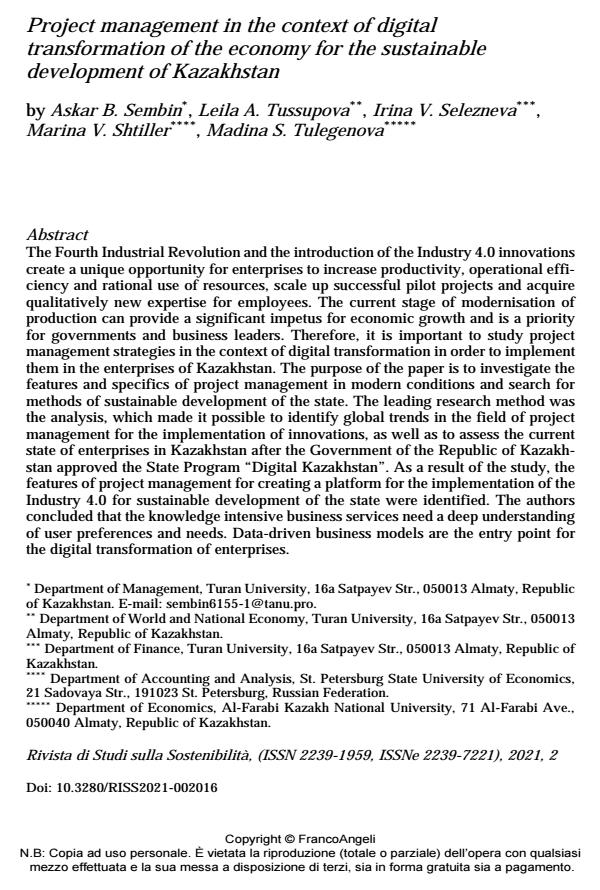Project management in the context of digital transformation of the economy for the sustainable development of Kazakhstan
Journal title RIVISTA DI STUDI SULLA SOSTENIBILITA'
Author/s Askar B. Sembin, Leila A. Tussupova, Irina V. Selezneva, Marina V. Shtiller, Madina S. Tulegenova
Publishing Year 2022 Issue 2021/2
Language English Pages 13 P. 217-229 File size 133 KB
DOI 10.3280/RISS2021-002016
DOI is like a bar code for intellectual property: to have more infomation
click here
Below, you can see the article first page
If you want to buy this article in PDF format, you can do it, following the instructions to buy download credits

FrancoAngeli is member of Publishers International Linking Association, Inc (PILA), a not-for-profit association which run the CrossRef service enabling links to and from online scholarly content.
The Fourth Industrial Revolution and the introduction of the Industry 4.0 innova-tions create a unique opportunity for enterprises to increase productivity, opera-tional efficiency and rational use of resources, scale up successful pilot projects and acquire qualitatively new expertise for employees. The current stage of mod-ernisation of production can provide a significant impetus for economic growth and is a priority for governments and business leaders. Therefore, it is important to study project management strategies in the context of digital transformation in order to implement them in the enterprises of Kazakhstan. The purpose of the pa-per is to investigate the features and specifics of project management in modern conditions and search for methods of sustainable development of the state. The leading research method was the analysis, which made it possible to identify global trends in the field of project management for the implementation of innovations, as well as to assess the current state of enterprises in Kazakhstan after the Gov-ernment of the Republic of Kazakhstan approved the State Program "Digital Ka-zakhstan". As a result of the study, the features of project management for creat-ing a platform for the implementation of the Industry 4.0 for sustainable devel-opment of the state were identified. The authors concluded that the knowledge in-tensive business services need a deep understanding of user preferences and needs. Data-driven business models are the entry point for the digital transformation of enterprises.
Keywords: industry 4.0, innovations, modern technologies, enterprise modernisa-tion, management.
Askar B. Sembin, Leila A. Tussupova, Irina V. Selezneva, Marina V. Shtiller, Madina S. Tulegenova, Project management in the context of digital transformation of the economy for the sustainable development of Kazakhstan in "RIVISTA DI STUDI SULLA SOSTENIBILITA'" 2/2021, pp 217-229, DOI: 10.3280/RISS2021-002016